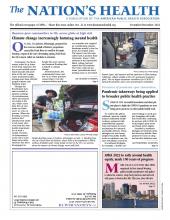
When it comes to advocating for climate justice, what do youth need to know? To answer that question, APHA’s Center for Climate, Health and Equity asked youth themselves. In July, the center hosted a roundtable with youth leaders in the climate movement. The leaders shared insights on their work and the role that young people can play in achieving equitable health outcomes and fighting climate change.
“We hope their words will help guide and inspire other young people to learn more and take action in their communities,” Katherine Catalano, MS, APHA’s deputy director of climate, health and equity told The Nation’s Health.
“It wasn’t until I saw Latina activists speaking out that I realized my voice is valid. Representation is crucial. There is a place for everyone in the movement. You don’t have to be an expert to get involved. Finding a group in your community is the best thing you can do to get started. There are lots of great organizations out there.”
— Magnolia Mead, Zero Hour policy organizer
“Activism can be whatever you want it to be, as long as you are doing good and making your community a better place. Some people go on-the-ground or attend rallies, but activism can also look like reposting a post, educating yourself about issues in your community or talking to community members. Reaching out to mentors is really helpful, because they know so much and can help build your confidence.”
— Rhea Goswami, co-founder and executive director, Environmental Justice Coalition

“Just because you are young doesn’t mean that your perspective isn’t important or needed. Just make sure to avoid overdoing it. Making time for all the things that are important to you is a good way to balance day to day life and activism work.”
— Natasha Matta, co-founder and director of content, Environmental Justice Coalition
“Even if you’re not old enough to vote yet, there are so many ways to get involved: help people register to vote, canvass on environmental issues, talk to decisionmakers about climate action, help educate other youth and get them engaged, use social media to amplify the work that others are doing.”
— Iris Zhan, co-founder, Fridays for Future Digital
“If you’re interested in getting involved in policy, it can be helpful to get to know your town councilors, find allies within the town board or whomever composes your local government. I turned to the town board and got involved with my local environmental committee.”
— Cade Cole, member, Student Climate Coalition
“Use social media to document your journey, show the actions you’re taking so your audience feels like they’re part of the same mission. Make the content interesting and remind the public that as much as this issue is broad and scary, there is so much we can do at the local level.”
— Alexander Restum, student researcher, Wayne State University
“When you want to engage with marginalized populations in your work, it’s important to be flexible. Communities are dealing with so much already they might not have the capacity to add to your platform. There should be an open invitation without expectation.”
— Tiffany Canate, MPH, project lead for workgroup on climate change and health, APHA Environment Section
“Anyone’s feelings around this crisis are valid. Lots of young people are experiencing anxiety and fear about the future, and this can be more intense for activists. We have agency to make change, but the climate crisis is so much bigger than any of us and it doesn’t have to rest on our shoulders. All we can do is try to keep going and do what we can do.”
— Evelyn Bigini, MSc, representative, Earth Uprising’s Global Youth Leadership Council
- Copyright The Nation’s Health, American Public Health Association









